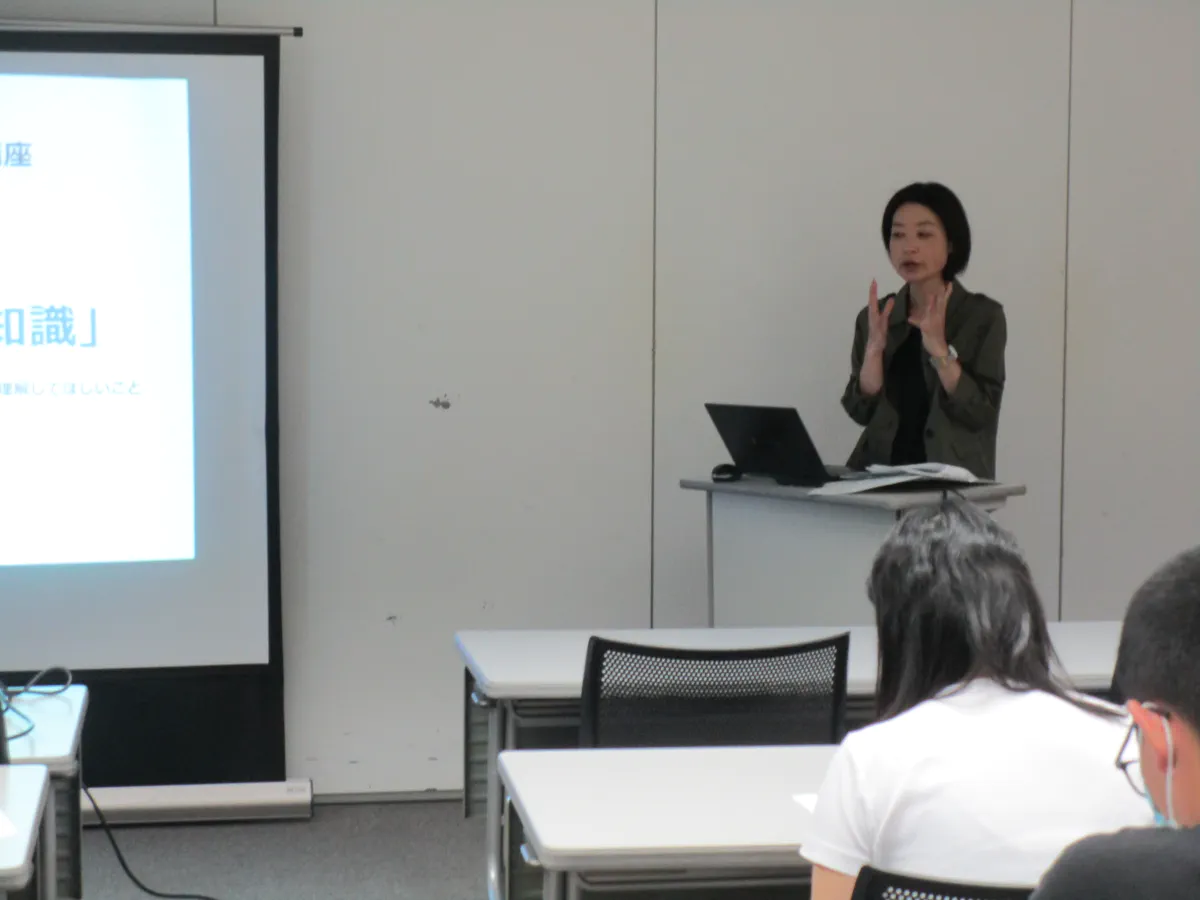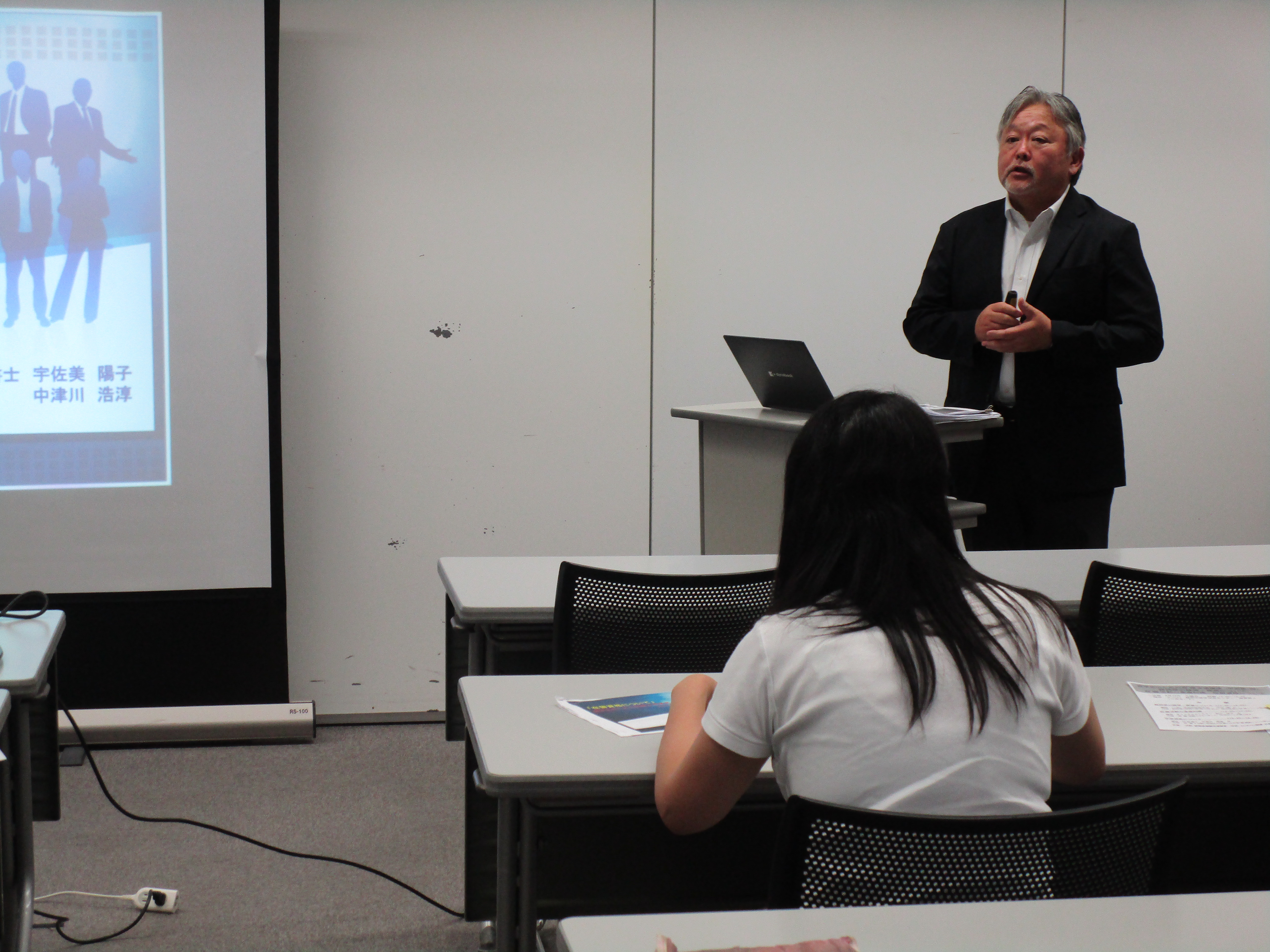
静岡県国際交流協会は、ふじのくに地域・大学コンソーシアム主催にて静岡県内企業に就職を希望する留学生に対し、就職に必要な知識やマナーの習得、静岡県の産業や企業についての理解を深めるための就職支援講座を実施しました。
今回は「就職活動の基礎知識」「在留資格について」 をご紹介いたします。
「就職活動の基礎知識」「在留資格について」
(中部)
日にち:令和6年6月29日 土曜日
場所:B-nest 静岡市産学交流センター 演習室4(ペガサート7階)
受講者数:20名
講師:キャリアカウンセラー 野口直子氏 行政書士 中津川浩淳氏
(西部)
日にち:令和6年8月1日 木曜日
場所:静岡大学浜松キャンパス 工学部7号館7-11
受講者数:4名
講師:キャリアカウンセラー 野口直子氏 行政書士 宇佐美陽子氏
内容:前半は就職活動の基礎知識について学びました。留学生の中には日本での就職を希望しても、日本独特の就職活動の進め方やスケジュールを把握していなかったために就職を断念した、という方もこれまでにおりました。この講座では、日本の就職活動の特徴や流れ、企業が留学生に求めていること等お話いただきました。日本では、大学生の多くが大学卒業までに就職先を決めること、複数の企業の選考に同時に応募すること、勉強と就職活動を両立する必要があること、それらによって日本での就職をあきらめないためにも早めに計画を立てた方がよい、等の説明がありました。
日本語能力の重要性については、卒業後は「日本で働く社会人」として見られ、多くの企業は社内公用語が日本語のため、企業が留学生に最も求める「コミュニケーション力」=「日本語能力」と、セットで考えた方が良いというお話もありました。面接についてのお話では、留学生が必ず聞かれる質問、それに対する返答の方法についても説明いただき、同じ内容でも返答の仕方次第では心象が変わること、就職活動の準備とはそこまでを考えるということ、といったアドバイスをいただきました。受講生からは、「早めに準備をすることが大切だとわかった」、「今まで面接での注意点を気にした事がなかった」などの感想があり、今回の講座で気づいた事が多かったようです。
後半は行政書士から、就職活動を進める上で欠かせない在留資格のことについて学びました。留学生が日本での就職活動を進める上で、就労可能な在留資格の種類、資格変更手続き等について把握しておく必要があります。講義の中では、就職に関連した在留資格について、内定から卒業、就職までの流れ、在留資格変更手続きに必要なことや、それぞれの資格(2023年4月より導入された特別高度人材制度(J-Skip)も含め)によって認められる具体的な活動例、許可事例や不許可となった事例等について詳しく教えていただきました。留学生からよく聞かれる質問に対する回答として、大学卒業後に在留期限が残っていたとしても、資格外活動は教育機関に在籍している間に限り有効なためアルバイトはできなくなること、就職活動を継続する場合は特定活動のビザで最長1年間滞在することができること等について説明の他、社会保険や税金の支払いについても在留資格変更の際の要件となるので、学生の時からしっかりしておく必要があると教えていただきました。質疑応答では、国民年金保険料の免除制度について質問があり、講座を聞いて初めて、やるべき申請をできていないことに気づいた学生もいました。就職活動や在留資格について知らなかったこと、改めて確認できたことが多くあり、大変参考になったようでした。
[English]
Shizuoka Association for International Relations, under the auspices of The Consortium of Universities and Local Communities in Shizuoka, held a job hunting support course for international students wishing to work for companies in Shizuoka Prefecture, to help them acquire the knowledge and manners necessary for employment and deepen their understanding of the industries and companies in Shizuoka Prefecture.
From among them, we report on “Basic Knowledge of Job Hunting” and “Status of residence” .
Job Hunting Support Lecture for International Students
“Basic Knowledge of Job Hunting” and “Status of residence”
(at Shizuoka)
Date : Saturday, June 29
Lecturer: Naoko Noguchi(career counselor)
Hiroatsu Nakatsugawa(administrative scrivener)
Place: B-nest Shizuoka City Industry-Academia Exchange Center 6th Floor Presentation Room
Number of participants: 19
(at Hamamatsu)
Date : Tursday, August 1
Lecturer: Naoko Noguchi(career counselor)
Yoko Usami(administrative scrivener)
Place: Shizuoka University Hamamatsu Campus, Faculty of Engineering Building 7-11
Number of participants: 4
In the first half of the class, students learned about the basics of job hunting. Some of the international students who had hoped to find a job in Japan gave up their job search because they did not understand the unique Japanese job-hunting process and schedule. In this lecture, Ms.Noguchi talked about the characteristics and flow of job hunting in Japan and what companies are looking for in international students. She explained that most university students in Japan decide where to work before graduation, that they apply to several companies at the same time, that they need to balance their studies and job hunting, and that they should make plans early to avoid giving up on finding a job in Japan due to these factors.
Regarding the importance of Japanese language ability, she said that after graduation, students are seen as “working members of society in Japan,” and since many companies use Japanese as their official in-house language, it is better to think of it as a set of “communication skills” = “Japanese language ability,” which companies most seek in international students.
In the job interview, she explained the questions that international students are always asked and how to respond to them. She taught us that even the same response can change the impression depending on how you answer the question. She told us that job search preparation includes even preparing how to answer questions in a job interview. Students commented that they learned the importance of preparing early and that they had never paid attention to what to pay attention to in an interview before.
In the second half of the course, students learned from an administrative scrivener about the status of residence, which is indispensable in proceeding with job-hunting activities. For international students to proceed with their job-hunting activities in Japan, they must understand the types of status of residence that allow them to work, procedures for changing status, etc.
In the lecture, the lecturer gave a detailed explanation of the status of residence related to employment, including the flow from job offer to graduation and employment, what is required for procedures to change the status of residence, examples of activities permitted under each status (including Japan System for Special Highly-Skilled Professionals (J-Skip) introduced in April 2023), and examples of permitted and denied cases. The lecture also included detailed explanations of cases of permission and cases of disapproval.
In response to questions frequently asked by international students, the lecturer explained that even if the period of stay remains after graduation from university, activities other than those permitted under the status of residence are only valid while enrolled in an educational institution, so part-time work is no longer possible and that students who wish to continue job hunting can stay in Japan for up to one year with a visa for specified activities. In addition, we were told that payment of social insurance and taxes is also a requirement for a change of status of residence, so it is necessary to make sure to do so from the time they are students.
During the Q&A session, there were questions about the National Pension Insurance premium exemption system, and some students realized that they had not made the applications they should have made until after listening to the course. There were many things they did not know about job hunting and the status of residence that they were able to reconfirm, and they found the course very informative.


